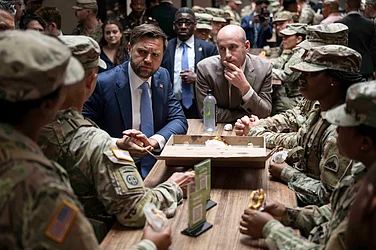In a letter from a soldier in Vietnam to his father while preparing a book called Brave Men, Gentle Heroes: American Fathers and Sons in World War II and Vietnam, there was a quote from a Greek Philosopher Plato "only the dead have seen the end of war.” When put to use, it means war never ends even if it seems it ends. Once the war begins, only humans end the war, but the war continues between nations forever.
Since October 7, TV screens and social media are flooded with graphic content featuring violence and bloodshed in the besieged Gaza strip. On October 7, Palestinian militant groups led by Hamas launched a coordinated surprise offensive on Israel. Israel began conducting retaliatory strikes before formally declaring war on Hamas a day later. To put it in context, 5,087 people were killed in Gaza in 18 days of Israeli bombing (over 60 per cent of them women and children), which is more than half of the civilians killed (9,614) in Russia's war in Ukraine in 20 months. Israel has the right to defend itself, but not at the cost of displacement and dehumanisation of millions of Palestinians. If we consider the attack by Hamas as terrorism, as western media and policy makers were quick to label it, what Israel is doing is savagery, barbaric, bloodthirsty and cold-blooded murder of Palestinians.
The international community has not done enough to protect the rights of Palestinians, especially those living in conflict zones. The silence is deafening and it makes the western world complicit. The international community being a witness and silent spectator to the massacre of Palestinians is a dangerous antecedent which will pave the way for a genocide more lethal than the holocaust. It will be wholly complicit in Israeli war crimes in Palestine if it doesn't use diplomatic influence to isolate Israel like it did to other states like Iran, Russia and Iraq.
The Israeli-Palestinian conflict stands as one of the most protracted and contentious disputes in modern history, marked by decades of violence, displacement, and human suffering. At its core, this conflict revolves around the quest for sovereignty and self-determination, with both Israelis and Palestinians claiming the right to a homeland. Amid this turbulent landscape, the international community's role in addressing the ongoing crisis has come under intense scrutiny.
Ineffectiveness of Diplomatic and UN Negotiations
The peace process between Israelis and Palestinians has yielded little progress because of the discriminatory bias of western powers towards Israel. This diplomatic failure has led to a continued cycle of violence and instability. Several rounds of peace talks, such as the Oslo Accords in the 1990s and the Camp David Summit in 2000, have failed to yield a lasting agreement. Various countries and regional powers have vested interests in the region, often backing one side over the other, which can hinder unbiased mediation efforts. The international community, including major powers and mediators, should use their diplomatic influence to bridge the gaps between the parties and create conditions for a sustainable peace process.
The UN remains a puppet in the hands of western powers especially the US in shielding Israeli war-crimes in the Gaza strip and the West Bank. The conflict's humanitarian impact, including displacement, lack of access to basic services, and economic hardships, persists due to the abrupt failure of the UN. There should be sufficient pressure on Israel to comply with these resolutions, which can lead to progress in resolving key issues such as borders, settlements, and the status of Jerusalem.
US Support to Israel
One of the key players in this conflict is the United States, which has maintained a close relationship with Israel for decades. The U.S.'s continued support and arms supplies to Israel have led to Israeli actions such as settlement expansion, demolition of Palestinian homes, and military operations in densely populated areas.The US and Israel are in close collusion to perpetuate one of the worst genocides in human history. Although these actions violate international law and humanitarian standards, the US veto of the UN resolutions is fueling Israel's brutality. The US military aid to Israel has played a crucial role in Israel's military capabilities and its ability to carry out operations in occupied territories. The U.S. has been indirectly supporting these actions by providing diplomatic cover for Israel in international forums.
Western Hypocrisy
Western nations often exhibit a bias in their approach towards Israel and Palestine. Israel, despite its controversial settlement policies and military actions, receives unwavering support from Western powers. Israel is committing a genocide in Palestine and the US and other European powers are aiding Israel in committing it. Immediately after the attack by Hamas, the US has openly declared its support to Israel and sent military and naval warships to fight against Palestinians. In his genocidal offensive, Netanyahu has been aided and abetted by Western countries in complete violation of international law. Israel's decades long brutal military occupation of Palestine has been enabled by western powers. The ongoing genocidal war – spearheaded by a Zionist regime and supported by its morally suspect Western allies is going to be one of the worst crimes against humanity.
Human rights organisations, which are typically expected to condemn such violations impartially, have been notably silent or insufficiently vocal on the plight of Palestinians. These organisations are being handicapped by political agendas, donor interests, or pressure from powerful nations, which is impacting the objectivity of their reports and statements related to the Israeli actions in Palestine. Human rights organisations are exhibiting double standards in their approach to different conflicts or political crises as is evident from their unequivocal condemnation of Iran's crackdown on women activists and their murderous silence on killing of women in Gaza.
The conflict is deeply intertwined with issues of colonialism and displacement.
There is a daily war in Palestine. When people's lives are frightened and the political sphere becomes fragile, rebellion becomes inevitable. You can't shoot your way out year after year by having blood on the streets. A just resolution requires acknowledging and rectifying historical injustices, ensuring the right of return for Palestinian refugees, and challenging the structures of occupation and discrimination.
The "two-state solution" has been a viable approach to resolve the Israel-Palestine conflict. This diplomatic resolution aims to establish two separate and independent states coexisting side by side: Israel for the Jewish population and Palestine for the Palestinian population. By establishing separate states, the solution aims to respect the national identities and aspirations of both Israelis and Palestinians. Although its implementation faces significant challenges, negotiations between the parties, with international support, are crucial for advancing this solution and achieving a lasting resolution to the Israel-Palestine conflict.
(The author is a researcher and a columnist who writes on conflict and cultural issues)



















